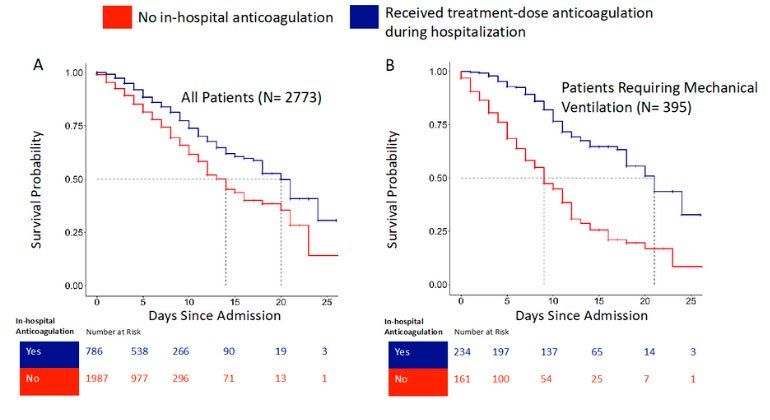Anticoagulants Improve Odds of Survival in COVID Patients
Researchers from the Mount Sinai COVID Informatics Center report improved survival rates in COVID patients treated with anticoagulants. Results of the study demonstrated that hospitalized COVID-19 patients treated with anticoagulants had improved outcomes both in and out of the intensive care unit setting, without a significant difference in bleeding.
PHOTO CREDIT: Mount Sinai Health System. Kaplan-Meier curve for hospitalized COVID-19 patients (A) and those requiring invasive mechanical ventilation (B). Colors indicate treatment-dose anticoagulation. Patients were right-censored if they were hospitalized at the time of data-freeze or discharged within the study period.

Researchers from the Mount Sinai COVID Informatics Center report improved survival rates in COVID patients treated with anticoagulants. Results of the study demonstrated that hospitalized COVID-19 patients treated with anticoagulants had improved outcomes both in and out of the intensive care unit setting, without a significant difference in bleeding.
The research was published in the Journal of the American College of Cardiology. Previous studies have shown that COVID positive patients frequently develop life-threatening blood clots, leading to potentially deadly thromboembolic events, and they authors say their findings could provide new insight on how to treat and manage coronavirus patients in the hospital.
"This research demonstrates anticoagulants taken orally, subcutaneously, or intravenously may play a major role in caring for COVID-19 patients, and these may prevent possible deadly events associated with coronavirus, including heart attack, stroke, and pulmonary embolism," said senior corresponding author Valentin Fuster, MD, PhD, Director of Mount Sinai Heart and Physician-in-Chief of The Mount Sinai Hospital in a statement. "Using anticoagulants should be considered when patients get admitted to the ER and have tested positive for COVID-19 to possibly improve outcomes.”
A team of investigators compared the survival rates of patients on blood thinners with those not on blood thinners in 2,773 confirmed COVID-19-positive patients admitted to five hospitals in the Mount Sinai Health System in New York City (The Mount Sinai Hospital, Mount Sinai West, Mount Sinai Morningside, Mount Sinai Queens, and Mount Sinai Brooklyn) between March 14 and April 11, 2020.
786 (28 percent) received a full-treatment dose of anticoagulants--one that is usually given to those who already have clots or are suspected to have clots. Treatment with anticoagulants was associated with improved hospital survival among COVID-19 patients both in and out of the intensive care unit setting. Of the patients who did not survive, those on anticoagulants lived longer than those not on anticoagulant therapy (an average of 21 days vs. 14 days). In ventilated patients, survival rates were markedly better in those patients on anticoagulants vs. those who did not receive the drugs. (62.7 percent compared to 29.1 percent for intubated patients treated with anticoagulants) and they also lived longer (9days compared to 21 days.)
All patients in the study had blood work done when they arrived at the hospital, which included measuring various inflammatory markers. The analysis of their records showed patients who received anticoagulants had higher inflammatory markers compared to patients not treated with anticoagulants. This may suggest patients with more severe illness may benefit from anticoagulants early on.
The observational study also explored the association of systemic anticoagulant treatment with bleeding events. Major bleeding was defined as 1) hemoglobin <7 g/dL and any red blood cell transfusion; 2) at least 2 units of red blood cell transfusion within 48 hours; or 3) a diagnosis code for major bleeding including intracranial hemorrhage; hematemesis; melena; peptic ulcer with hemorrhage; colon, rectal, or anal hemorrhage; hematuria; ocular hemorrhage; and acute hemorrhagic gastritis. Among those who did not receive anticoagulants, 38 (1.9 percent) patients had bleeding events, compared to 24 (3 percent) among those who received anticoagulants, p=0.2).
"We are hopeful that this report of the association of anticoagulation therapy with improved survival will be confirmed in future investigations," says David Reich, MD, President and Chief Operating Officer of The Mount Sinai Hospital.
Researchers say while the results are encouraging, more data is needed. They plan to extend the study to an even greater number of patients, and evaluate the effectiveness of three different drugs: oral antithrombotic, subcutaneous heparin, and intravenous heparin.
Paranjpe I, Fuster V, Lala A, et al. Association of Treatment Dose Anticoagulation with In-Hospital Survival Among Hospitalized Patients with COVID-19 [published online ahead of print, 2020 May 5]. J Am Coll Cardiol. 2020;S0735-1097(20)35218-9. doi:10.1016/j.jacc.2020.05.001